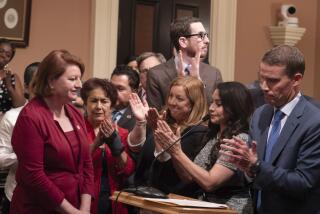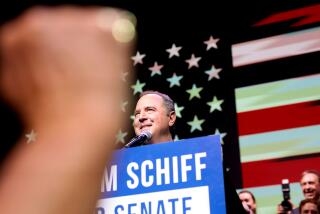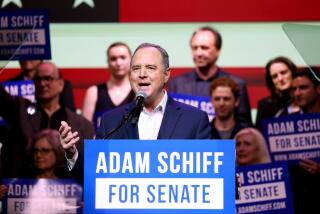Herschensohn Win Sets Stage for 2 Bruising Senate Battles : Campaign: Contrast between the conservative ex-commentator and the liberal Boxer is one of the sharpest in years. In the other race, Seymour says he will be aggressive against Feinstein.
Conservative Republican Bruce Herschensohn won the fourth and final slot in California’s historic U. S. Senate field Wednesday, and the GOP and Democratic nominees immediately kicked off what promised to be a bruising battle for the two Senate seats.
The fall lineup provides a dramatic mix of personalities and ideologies for the two Senate seats, most notably the choice of Democratic voters to field a slate of two women. Competing for the full six-year term of the seat now held by Democrat Alan Cranston, who is retiring, are:
* Herschensohn, 59, a Republican. He is a former KABC television commentator who has never held office but who worked in the Kennedy, Johnson and Nixon administrations. A specialist in foreign policy, he opposes any defense cuts because of continued danger in the world.
* Barbara Boxer, 51, a five-term liberal Democratic congresswoman. She was born in New York City, moved West to be a stockbroker and got into politics at the grass-roots level in Marin County during the Vietnam War. A vigorous campaigner, she has built a loyal statewide constituency and fund-raising base over the past two years.
Seeking the final two years of the Senate seat won in 1988 by Republican Pete Wilson are:
* Republican John Seymour, 54, a former mayor of Anaheim and owner of a real estate agency. He wooed the Los Angeles Rams to his city and was elected to the state Senate. Wilson appointed him to the U.S. Senate after relinquishing the seat to become governor in January, 1991.
* Democrat Dianne Feinstein, 58. A San Francisco native and city-county supervisor, she became mayor in 1978 when George Moscone was assassinated. She won the Democratic nomination for governor in 1990 but lost to Wilson by 3.5% of the total vote.
The closest of the four primary races was the Republican race won by Herschensohn; the result was not known until early Wednesday morning. Herschensohn, a burly man known for his gentlemanly manners and his cerebral approach to campaign politics, received a concession call from his bitter campaign rival, Rep. Tom Campbell of Palo Alto, at 8:15 a.m. at the GOP headquarters hotel, the Marriott at Los Angeles International Airport.
Barely half an hour later, Herschensohn joined Seymour at a Republican unity breakfast in a ballroom addressed by President Bush by satellite television.
Herschensohn, a smile fixed across his craggy face, seemed almost dazed by the victory. He ran for the Senate in 1986, but lost to Silicon Valley moderate Republican Ed Zschau, who is something of a Campbell mentor. Later in the day, Boxer stumbled in pronouncing Herschensohn’s name, saying she did not expect him to be her general election opponent.
Campbell, on leave as a Stanford Law School economics professor, greeted Herschensohn, a 56,000-vote winner--out of 2.3 million cast--warmly and declared: “Bruce, I’m proud to be your friend and supporter. Call on me for anything I can do.”
As recently as the weekend, Campbell was telling virtually every California family via television ads: “Bruce Herschensohn is lying.”
When President Bush appeared on a giant television screen by satellite transmission, he told the California audience, “We need you once more . . . I can only win with your continued support.”
By then, the Democratic team was already on the move.
Just 12 hours after the polls closed at 8 p.m. Tuesday, jubilant Democratic nominees Feinstein and Boxer kicked off an airborne victory lap of California.
Their tour guide was Democratic state Chairman Phil Angelides, who told a news conference that he expects a great victory on Nov. 3. But Angelides said he has no illusions about the difficulty of the task.
“The other side plays hard. They play tough. They play mean. They know they are in a fight,” he said.
Then the two women candidates flew off on a 12-seat Gulfstream One jet for similar appearances in San Diego, San Francisco and Sacramento.
For months, Angelides had planned the plane tour for whichever bleary-eyed candidates had won the primary as a way of avoiding the letdown that often hits contenders after a contested primary.
That is what happened when Feinstein woke up broke and exhausted the morning after winning the 1990 primary campaign for governor. A rested Republican Sen. Pete Wilson, his campaign treasury bulging and computer discs full of Feinstein facts, began hitting Feinstein with television ads when she was not prepared to respond. She said later that this was the low point from which her campaign never really recovered.
On Wednesday, Feinstein embarked on a new campaign with a mission of upsetting the status quo. Boxer said the two Democrats are out to “shake up” the state of California.
They were asked repeatedly about “women’s” issues, but there will be much more than that at stake as the campaign unfolds. Never have California voters had a chance to elect two U. S. senators at one time. And rarely have they had the sort of ideological range the Boxer-Herschensohn campaign presents--perhaps not since the contest between the Democrat Cranston and the late Republican Max Rafferty in 1968.
If elected, Herschensohn would rank among the most conservative Republican members of the Senate, along with Jesse Helms of North Carolina and Orrin Hatch of Utah. If she is chosen, Boxer--with her star-studded ACLU ratings--would be among the most liberal of Democrats.
Seymour and Feinstein fall into a more narrow band on the spectrum. Seymour is a moderate on issues such as choice on abortion, civil rights for homosexuals and drilling for oil off the California coast.
Feinstein supports the death penalty and a line-item veto of budget items for the President. But significant differences remain, and Seymour made it clear Wednesday that he would not hesitate to attack her on items like her fiscal record as mayor of San Francisco and problems with reporting campaign contributions and expenditures in her campaign for governor.
“I intend to be very, very aggressive,” Seymour said. “Am I going to talk about $8 million worth of campaign contributions and campaign expenses that were misreported? You bet I am.”
Feinstein’s primary opponent, state Controller Gray Davis, used that issue against Feinstein, but it did not seem to have a significant impact. Wilson used the San Francisco issues, and others, against Feinstein in 1990 with uncertain impact.
Seymour has postured as an outsider even though he is an incumbent member of the Senate and a former holder of other local, state and federal offices since 1978. His major problem has been to become well known throughout the state. Polling has shown that he is not as widely known among voters as might be expected of a sitting U. S. senator.
Seymour prides himself on being a self-made man, often boasting that he became a millionaire through perseverance and hard work. He was a leader of the conservative caucus in the state Senate before changing positions on abortion and homosexual rights--actions that infuriated conservatives.
Feinstein in 1990 was often viewed as too aloof to be an effective campaigner, and as being slow to react to Wilson’s thrusts and barbs. But she has developed into a far more effective and confident campaigner this year. She has put far more emphasis on women’s issues, saying her gender hurt her in the campaign for governor but is an advantage in running for the Senate.
Feinstein can be expected to tell voters that they can trust her on issues such as abortion with far more confidence than Seymour.
In Burbank, she said, “I would characterize John Seymour as part of the status quo, part of the Reagan-Bush mentality that existed for the past 12 years, someone who has changed his position based on his political opportunities.”
If there are sharp ideological differences between Herschensohn and Boxer, their contrasts in personality and campaign style are just as pronounced.
Herschensohn often seems uncomfortable handling political questions and decisions, usually deferring them to his seasoned campaign manager, Ken Khachigian, a former Ronald Reagan and George Deukmejian aide.
Herschensohn said Wednesday that he did not plan to attack Boxer on her bounced House checks, a tactic tried--apparently with little effect--in the primary campaign.
He takes offense when his political positions are attacked or, in his view, distorted by an opponent. Herschensohn pounded away day after day all spring that Campbell was too liberal for California Republicans. In his concession speech Wednesday, Campbell said that seemed to be so, particularly his aggressive support for a woman’s right to choose an abortion.
If Herschensohn tried to picture Campbell as too liberal, he will do the same with Boxer with double intensity.
Herschensohn also said of the gender issue, “The fact that she’s a woman is inconsequential.”
Boxer, facile at fashioning quotable sound bites, campaigned throughout the state the past year declaring “I’m a fighter.” She is likely to portray Herschensohn as an anachronism with his insistence that the federal government be returned to the more basic roles envisioned by his heroes, Thomas Jefferson and James Madison, and that the defense budget not be cut.
Boxer can be expected to draw the contrast of Herschensohn’s opposition to abortion with the abortion rights position of the other three nominees, including the Republican Seymour.
On Wednesday in Burbank, Boxer said: “It is going to become very clear that the race is going to boil down to a fighter for all the people of California versus an extremist who is quite out of touch with the people of California. And that will be made known.”
ELECTION STORIES, TABLES, PICTURES: A3, A16-A24, B1-B3
The following contributed to Times election coverage: Mike Alvarez, Christina Chaplin, Edgar Duarte, Mike Faneuff, Kevin Fox, Laura Galloway, John Hernandez, Christina Kelch, Anthony Kelker, Roshawn Mathias, Scott Masko, Margaret McEwan, Kerry Murphy, Carlos Santana and Onna Young.
More to Read
Get the L.A. Times Politics newsletter
Deeply reported insights into legislation, politics and policy from Sacramento, Washington and beyond. In your inbox three times per week.
You may occasionally receive promotional content from the Los Angeles Times.






